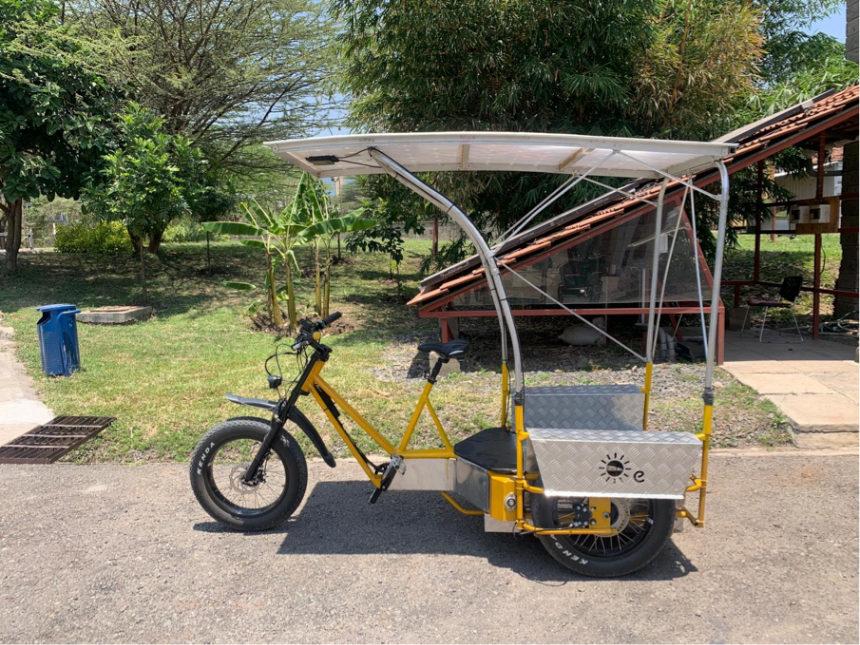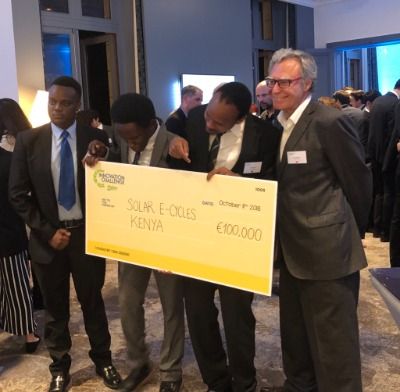Solar e-Cycles Empowering people 2021
Solar powered electric cargo tricycles ($3.50&100km/d, 35kph, 300kg) MaaS + micro business mgmt training + revenue generation models. Rapid-scaling thru capacity-building training center, IoT-connected fleet mgmt, GPS & mobile off-grid electricity.

This project is a collaboration between Solar E-Cycles and Strathmore University in Kenya targeting the scaling of a self financing e-trike leasing business with an integrated entrepreneurial capacity building component.
Solar E-Cycles will launch in 2021 a pilot project in Kakuma, a town in northwestern Turkana County, Kenya. It is the site of a UNHCR refugee camp, established in 1992. The population of Kakuma town was 60,000 in 2014.
This is the first step in an overall program to lease 5,000 solar powered e-tricycles (called a Try.Ke) to selected customers across Kenya to prove out this business model so as to attract impact investors and scale across Africa. Strathmore University Institute of Small Business Initiatives will train selected users in micro-business management of a variety of revenue generation models and will monitor impacts.
The solar powered light electric tricycle has a range of 100km a day, 1.5kWh of energy storage daily from the sun with a 300kg load, electrically assisted pedelec that reaches 35kph. It is an IoT connected device that creates jobs in i) street vending, ii) last mile delivery and iii) off-grid applications. We plan to scale across Africa.
Target Customers:
The initial target community will be mostly women selected through a competitive proposal process with need for mobility, access to electricity and revenue. The project will target persons - between the ages of 18 to 45, with explicit targets on the youth, women and persons with disabilities following their likelihood to uptake new technology and need for economic empowerment. The project will seek to be gender inclusive. It is proposed that some 20 try.ke and another 20 e-bikes be mobilized during this pilot.
Our solar powered tricycles essentially replace internal combustion engine motorcycles which are imported at the rate of 30 million a year to Africa. Solar panels on the tricycles charge batteries continuously during daylight hours to operate electric motors thus avoiding the use of petroleum fuels and lubricants. Greenhouse gas potentially avoided is 3,2 tons per year in the city. Motorcycles emit 416% more hydrocarbons, 3,220% more oxides of nitrogen and 8,065% more carbon monoxide, and are noisy. Partially powered by human effort, users gain health benefits estimated at $1,16 a km by the World Bank.
There are many development challenges facing African populations. Our solution tackles these 5 SDG mainly:
- Good Jobs and Economic Growth - Our focus is on creating capacity and jobs
- Affordable & Clean Energy - We are solar powered and use Paygo to reduce access barriers to energy
- Climate Action - Our product replaces the worst transportation polluters - motorcycles
- Gender equality - Our policy is to service and employ at least 50% women in our business.
- Sustainable cities and communities - Our solution relieves traffic issues in cities
Transport is the world’s fastest growing source of energy-related carbon emissions. It accounted for 23% of energy-related GHG emissions in 2010, and, within that, urban transport was the largest single source. Because of profound effects on sustainability, health, economics and quality of life, improving transport can solve many problems all at the same time. Beyond these environmental and social benefits, investments and measures in low-carbon passenger transport have returns that are miles ahead of other sectors, including buildings, material efficiency, and waste. Transitioning to a more efficient and electric vehicle fleet in cities worldwide would pay for itself in eight years. Promoting non-motorized transport delivers the second-largest net present value of all low carbon urban investments modelled by the World Bank.
Our project has 4 dimensions:
1 The core of our project is a true innovation, a solar powered light electric tricycle, in delta configuration made from off the shelf PV and e-bike parts, assembled in Kenya with a range of 100km a day, 1.5kWh of energy daily from the sun, 300kg load rating, electrically assisted pedaling with up to 35kph speed rating. In addition to being a transportation device It is a mobile generator able to provide electrical power in 240V AC, 12V and 48V DC and USB. It is a substitute for motorcycles and avoids greenhouse gas emissions. But it does more.
2 The service we provide is an integrated economic development tool. It creates jobs for people. We train people on how to use our tricycle to earn revenue. We propose different revenue generation models such as i) street vending (mobile marketing and sales, coffee, ice cream, food truck, electric power, light and sound events, etc.), ii) last mile delivery (leasing the trike to drivers working for companies like Glovo, Uber eats, Twiga, Sendy) and iii) off-grid applications where in addition to the previous potential services it is also a solar home system for a single family or shared with others as a micro-grid for access to power.
3 The third dimension to our project is fleet management. We have developed our own on-board data and power management system that monitors all critical KPI data from different components on each tricycle. It allows us to remotely monitor items such as battery charge level, GPS location, speed, and range. It monitors the condition and health of the different components on the tricycle. For example battery and motor temperature, solar panel performance, weight, even tire pressure. We can track the energy consumption along any route followed by our users. And we can develop historical data on each user. Provide warning messages and communicate to him information on the forecasted use of energy he could need to get to a specific location. It is two way communication. This system will also inform our maintenance team on where the vehicle is located, if it has a flat tire or low batteries so our customer support team can intervene. Statistics on the way people drive will guide our training and communication programs. KPI data will allow us to do programmed maintenance and orient product improvements to continuously improve availability and reduce the cost of our solution and better respond to customer needs.
4 Finally our rapid scaling approach is oriented towards generating impacts for users across Africa through, first, a campus type training center for business unit personnel. Where we actually run a tricycle leasing-sale business in Strathmore U. where all personnel get hands-on training. We train drivers, mechanics, commercial personnel, salesmen and all the administrative personnel on all aspects of the product and the service. The latter includes of course for personnel in procurement, accounting, HR but also our impact measurement team. The latter is responsible to monitor through baseline surveys and follow up surveys (delta) what impact is being achieved by users of our tricycles so that we can guarantee that each vehicle will pay for itself and our business model is sustainable. Through this method we can easily open up new business units anywhere in Africa and with the help of the on-board data and power management system remotely supervise the distributed operations. As we scale we will be developing more specific monitoring software with KIP indicators for business unit performance.
The product design and the leasing mechanism makes our try.ke® affordable for $3,50 a day so that the poorest of the poor can afford it. We have a fully developed financial model that shows gross margins over 50% from year 3.
Meet the solution owner
